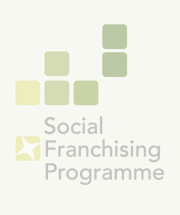About Social Franchising
Social Franchising
Franchising is when the owner of a commercial business grants a licence to another person or business to use their business idea and/or model - often within a specific geographical area or "territory".
In the Social Franchising Manual, social franchising is defined as "the application of commercial franchising methods and concepts to achieve socially beneficial ends".
The manual also offers an alternative definition that describes social franchising as "the use of a commercial franchising approach to replicate and share proven organisational models for greater social impact".
These definitions describe social franchising in it's truest form, but there are other ways in which organisations can leverage the franchising model to achieve socially beneficial outcomes.
A community and voluntary or social economy sector organisation may acquire a commercial franchise in order to meet a need in their community (such as employment or a healthcare provision) or simply to generate an unrestricted source of income that can then be used to help the organisation achieve its social aims and objectives.
For more information please visit our resources page








